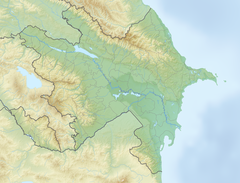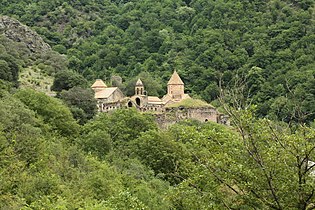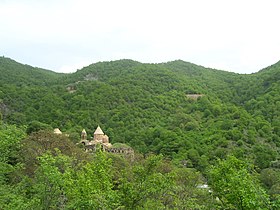Dadivank
| Dadivank | |
|---|---|
Դադիվանք | |
 The monastery of Dadivank | |
| Religion | |
| Affiliation | Armenian Apostolic Church |
| Location | |
| Location | Vəng, Azerbaijan |
| Geographic coordinates | 40°09′42″N 46°17′18″E / 40.1616°N 46.2882°E |
| Architecture | |
| Type | Monastery, Church |
| Style | Armenian |
| Completed | 9th–13th centuries |
Dadivank (Armenian: Դադիվանք) or Khutavank (Armenian: Խութավանք, lit. 'monastery on the hill'[1]) is an Armenian Apostolic[2][3] monastery in the Kalbajar District of Azerbaijan. It was built between the 9th and 13th centuries and is one of the main monastic complexes of medieval Armenia.[4]
In Azerbaijan, the monastery is called Dadivəng or Xudavəng.[1] Azerbaijan denies the monastery's Armenian religious and cultural heritage, instead falsely referring to it as a "Caucasian Albanian temple."[5][6]
History and architecture

The monastery is said to have been founded by St. Dadi, a disciple of Thaddeus the Apostle who spread Christianity in Eastern Armenia during the first century AD. However, the monastery is only first mentioned in the 9th century. In July 2007, the grave said to belong to St. Dadi was discovered under the holy altar of the main church.[7] The princes of Upper Khachen are also buried at Dadivank, under the church's gavit (narthex).[8]
The monastery belongs to the Diocese of Artsakh of the Armenian Apostolic Church, and consists of the cathedral church of the Holy Mother of God, the chapel, a kitchen and refectory, and a few other buildings.[9] The main church has Armenian script engraved into its walls, in addition to several 13th-century frescoes.[10] The bas-relief on the south facade of the cathedral at Dadivank, built in 1214, shows the princess offering the church in memory of her sons.[11] According to Paolo Cuneo, Dadivank is one of two monasteries along with Gandzasar where bust motifs (possibly the donors of the monasteries) are encountered.[12] Antony Eastmond places Dadivank's construction within a wider context of examples of female patronage of ecclesiastical buildings in the thirteenth-century Near Eastern world.[13]
Modern period
In 1994, following the end of the First Nagorno-Karabakh War, the monastery resumed service, and in 2004, a renovation process began with funding from Armenian-American businesswoman Edele Hovnanian, ending in 2005. The restoration efforts restored the cathedral, along with a chapel which was restored by Edik Abrahamian, an Iranian-Armenian from Tehran.[14]
On 8 October 2001, a motion was proposed at the Parliamentary Assembly of the Council of Europe at the behest of sixteen parliamentary members on the "Maintenance of historical and cultural heritage in the Nagorno-Karabakh Republic." The motion cited as an example "the destruction of Zar (Tsar) monuments in the Kelbajar region, Dadivank, which the local Muslim population regarded as remnants of the Armenian Christian religion and ruined the monastery as it could".[15]
In August 2017, Italian specialists who had previously conducted restoration operations at Dadivank returned to continue their cleaning and restoration of the monastery. They had already restored the four chapels and their frescoes and were planning to restore inscriptions and ornaments near the doors to the chapels. The entire restoration project was planned to be completed by 2020.[16]
2020 war and current status
In the aftermath of the Nagorno-Karabakh war in 2020, which resulted in a ceasefire agreement stipulating the withdrawal of Armenian forces from Kalbajar District and its return to Azerbaijan, the monastery was included in the territory to come under Azerbaijani control. The abbot of the Dadivank Monastery made the decision to transport the monastery's relics of significance, including bells, crosses, and khachkars, to Armenia for protection from destruction by the Azerbaijani government.[17][18] Azerbaijan called it an "illegal activity" and added that it would take action to enforce legal procedures.[19]
On 28 November 2020, the Azerbaijani Ministry of Defence released footage from inside the monastery.[20] On 4 December 2020, representatives of the Udi community of Azerbaijan visited the monastery and performed a prayer inside.[21] The next day, Rafik Danakari, the deputy chairman of the Udi Christian Orthodox community, was appointed preacher at the monastery.[22]
A sale-exhibition From Dadivank to Yerevan was held on 16 December at the Museum of Folk Art in the Armenian capital.[19] After the withdrawal of Armenian forces from the region, the monastery was placed under the protection of the Russian peacekeeping forces.[23] In late December additional Armenian clergymen arrived at the monastery and the first wedding ceremony was performed after the war, under the protection of Russian peacekeepers.[24][25]
Gallery
- Dadivank
- Fragment of a 13th-century fresco with Armenian inscribed text in Dadivank Monastery, a masterpiece of medieval culture of Artsakh
- Khachkars at Dadivank
- Side view
- Armenian-inscribed text of Queen Arzu of Haterk, Dadivank Monastery (13th century)
- General view
- The 13th-century double khachkars of the memorial bell-tower of the Dadivank Monastery with their Armenian inscriptions
See also
- Armenian architecture
- Armenian cultural heritage in Azerbaijan
- Christianity in Azerbaijan
- Culture of Artsakh
Further reading
- (in Italian and English) Comneno, M. Lala, Paulo Cuneo, and S. Manukian. Gharabagh, Documenti di architettura armena, no. 19. Milan: Edzioni Ares, 1988.
References
- ^ a b Dominique Auzias, Jean-Paul Labourdette, Petit fûté Arménie. Paris: Nouvelles éditions de l'Université, 2005, p. 203.
- ^ Comneno, M. Lala, Paulo Cuneo, and S. Manukian. Gharabagh, Documenti di architettura armena series, no. 19. Milan: Edzioni Ares, 1988.
- ^ J. M. Thierry and Murad Hasratian, "Dadivank en Arc'ax," Revue des Études Arméniennes 16 (1982): 259-88.
- ^ Walker, Christopher (1991). Armenia and Karabagh: The Struggle for Unity. London: Minority Rights Group. p. 78.
- ^ "Alban-udi dini icmasının nümayəndələri Xudavəng monastırında Milad bayramını qeyd ediblər". azertag.az (in Azerbaijani). Retrieved 28 May 2021.
- ^ "Xudavəng alban məbəd kompleksi". www.virtualkarabakh.az. Retrieved 28 May 2021.
- ^ В старинном монастыре Нагорного Карабаха обнаружены мощи одного из учеников Иисуса Христа. Regnum, 30 July 2007.
- ^ Murad Hasratian, "Le complexe monastique de Dadivank," in Giulio Ieni and Gabriella Uluhogian, eds., Atti del terzo Simposio internazionale di arte armena: Milano, Vicenza, Castelfranco V., Piazzola sul Brenta, Venezia, 25 settembre-1 ottobre, 1981. Venice: Accademia armena de San Lazzaro dei Padri Mechitarist, 1984, pp. 275-87.
- ^ Robert G. Ousterhout. A Byzantine Settlement in Cappadocia. Washington, D.C.: Dumbarton Oaks Research Library and Collection, 2005, p. 151. "In the Armenian monastery of Dadivank', however, dated 1211, a four-columned, domed hall is set into a range of rooms chat included the kitchen and refectory."
- ^ Lydia А. Durnovo, Ocherki izobrazitel’nogo iskusstva srednevekovoi Armenii [Essays on illustrated medieval Armenian art] (Moscow: Iskusstvo, 1979).
- ^ Vrej Nersessian, Treasures from the Ark: 1700 Years of Armenian Christian Art. (London: British Library, 2001).
- ^ Paolo Cuneo, Architettura Armena. (Rome, 1988), pp. 450, 761, cited in Alpaghian, Raccolta di scritti in onore di Adriano Alpago Novello, Italy, 2005.
- ^ Eastmond, Antony (2017). Tamta's World: The Life and Encounters of a Medieval Noblewoman from the Middle East to Mongolia. Cambridge: Cambridge University Press. p. 195.
- ^ "Restoration in Dadivank". Research on Armenian Architecture. 2005. Retrieved 12 November 2020.
- ^ "Doc. 9256 - Parliamentary Assembly of the Council of Europe". Retrieved 13 June 2017.
- ^ "Italian specialists to arrive in Karabakh to continue Dadivank Monastery restoration". News.am. 2 August 2017. Retrieved 12 November 2020.
- ^ "Father Hovhannes of Artsakh's Dadivank Monastery to bring bells and cross to Armenia". News.am. 10 November 2020. Retrieved 12 November 2020.
- ^ Mutch, Tom (10 December 2020). "Cultural Heritage Is Caught Up in the Conflict Over Nagorno-Karabakh". Atlas Obscura. Retrieved 16 February 2021.
- ^ a b "Bu günün xəbərləri: 136 Türkiyə minaaxtaranı Azərbaycanda, Suqovuşan və Talış kəndlərinə gedən yollar asfaltlanır". BBC Azerbaijani Service (in Azerbaijani). 16 December 2020. Retrieved 16 December 2020.
- ^ "Kəlbəcər rayonunun Vəng kəndindən video". BBC Azerbaijani Service. 28 November 2020. Retrieved 28 November 2020.
- ^ "Между удинами и армянскими священниками возник спор в монастыре Худаванг Кельбаджарского района - ВИДЕО". Oxu.az (in Russian). 4 December 2020. Archived from the original on 4 December 2020. Retrieved 4 December 2020.
- ^ "Preacher appointed to Khudavang monastery in Kalbajar". AzVision. 5 December 2020. Archived from the original on 15 December 2020. Retrieved 15 December 2020.
- ^ "Dadivank under protection of Russian peacekeepers". Armenpress.am. 14 November 2020. Retrieved 14 November 2020.
- ^ Ghazanchyan, Siranush (23 December 2020). "New group of Armenian priests leaves for Dadivank". Public Radio of Armenia.
- ^ Ghazanchyan, Siranush (27 December 2020). "Armenian couple marries at Dadivank Monastery". Public Radio of Armenia.












